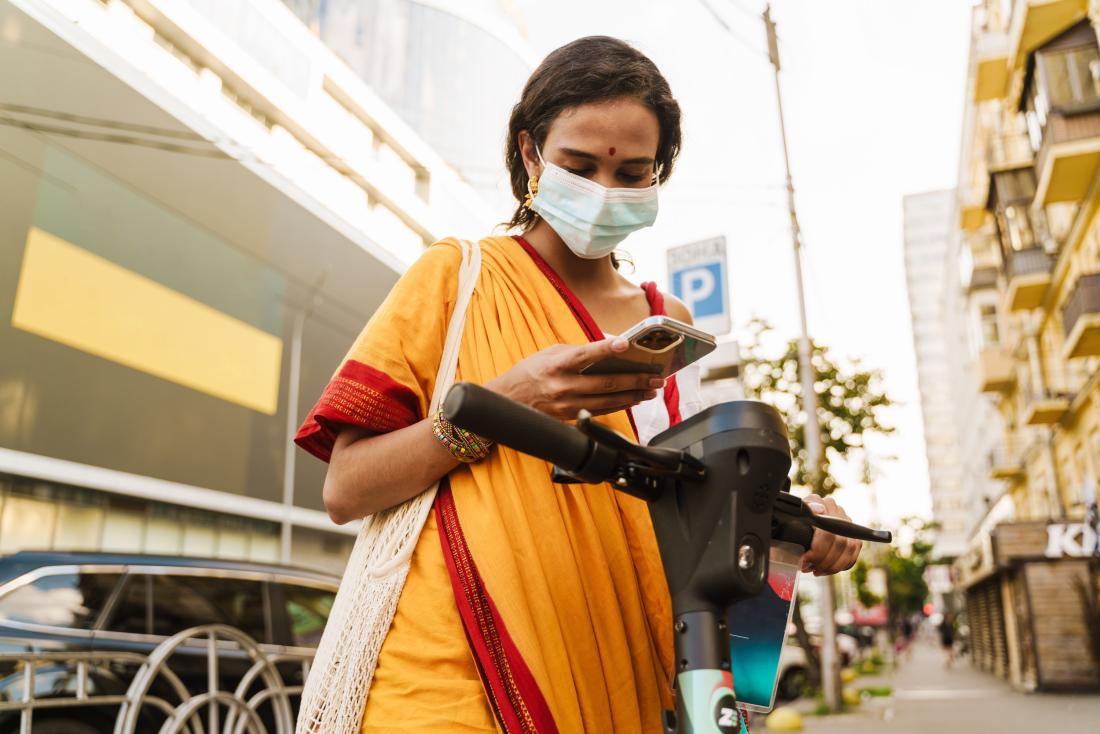Using Text Messages to Prevent the Spread of Covid-19 in India
- Families and households
- Communicable diseases
- Health outcomes
- Take-up of program/social service/healthy behavior
- Information
- Nudges and reminders
- COVID-19 response
Even if information on what behaviors to adopt to prevent the spread of infectious disease is widely publicized, compliance may be low. Several months into the Covid-19 pandemic, researchers tested whether reminders delivered via text message improved knowledge and adoption of social distancing and handwashing. They found no evidence that individuals changed their self-reported behaviors. This finding may highlight limited effectiveness of SMS-based information campaigns after the initial phase of the pandemic.
Policy issue
During an infectious disease outbreak, communication is critical to raise awareness about behaviors that can slow its spread.1 Disease containment is especially important in low- and middle-income economies which may have densely populated areas, and weak health systems. However, even when information about effective behaviors is widely publicized, compliance can be low. While previous research has shown that nudges can be effective at changing health behavior, more research is needed on important design features, such as timing and framing.
Context of the evaluation
The study took place in India where, throughout the pandemic, public service announcements advocating handwashing and social distancing to combat Covid-19 were widely distributed via television, radio, newspapers, and text messages. Nevertheless, India had officially recorded a cumulative total of 2.7 million confirmed Covid-19 cases by August 2020, the third highest confirmed case count in the world,2 and the true case count was estimated to be higher. As cases rose, the state of Bihar, India, where the study took place, imposed full and partial lockdowns.
Cell phone-based information provision was feasible in Bihar, as cell phone ownership was almost universal among households. However, although 86 percent of respondents in the sample said they could read SMS in Hindi, 36 percent said they never read text messages. Less than a third read SMS messages daily in the week prior to their interview.

Details of the intervention
Researchers partnered with the Government of Bihar and Suvita, an NGO working on routine immunization in Bihar to study the impact of different SMS messages on health behaviors. In order to identify the most effective way to nudge the adoption of appropriate health behavior, researchers sent SMS messages in Hindi that encouraged social distancing and handwashing parallelly to two groups of participants whose phone numbers were randomly selected. Messages varied in their framing and timing, in order to better understand the importance of each.
Each message had one of five framings. Four of the five appealed to a different emotion, such as fear (by making the threat of the pandemic salient) or prosocial motivation (by highlighting how their actions would affect their community). The fifth message had a neutral frame and included simple, direct advice. No messages were sent to participants in the comparison group.
When the messages were sent also varied, with texts being sent out either twice in the morning (7-8 a.m. and 10-11 a.m.) or once in the morning and once in the evening (7-8 a.m. and 6-7 p.m.), with the timing selected randomly.
Participants were selected out of households who entered phone numbers into birth registries at health centers in 15 blocks of Saran between August 2019 and February 2020. They received a total of four messages over two days.
Researchers conducted phone surveys with SMS recipients and comparison group participants three to five days after the first message was sent to measure adoption of social distancing and hand washing. Behaviors were measured using an open-ended question, “What are you doing to protect against the virus?” Additionally, a list of preventive behaviors was read out and participants were asked if they practiced each.
This process was then repeated nine additional times, for a total of ten rounds. In each round, the proportion of the recipients who received messages with a given framing and at a certain timing varied based on which timing and framing proved most effective in the previous round of messages.
Results and policy lessons
The researchers found no evidence that SMS messages improved knowledge or adoption of social distancing and handwashing, regardless of the method used to measure the outcomes, the timing and framing of the message, or the literacy and recall period of the respondents.
The study found no meaningful impact of the SMS-based nudges on social distancing or handwashing, regardless of the message’s framing or timing. This may have occurred for three reasons. First, the study took place at an advanced stage of pandemic, and respondents might already have been fatigued by pandemic-related nudges from other sources. Additionally, reported local infection rates were low, and the lack of the salience of the threat of Covid-19 may have been responsible for reduced responsiveness. Finally, SMS might not have been an engaging enough medium to deliver nudges.
Furthermore, texts about social distancing and handwashing did not have any meaningful effect on other Covid-19 preventive behaviors, such as mask-wearing or respiratory hygiene.
Although delivering reminders via text messages can be cost-effective and easily scalable, it may be ineffective at encouraging pandemic-appropriate behaviors, particularly after the initial stage of a pandemic.
Bavel, Jay J. Van, Katherine Baicker, Paulo S. Boggio, Valerio Capraro, Aleksandra Cichocka, Mina Cikara, and Molly J. Crockett et al. 2020. "Using Social And Behavioural Science To Support COVID-19 Pandemic Response". Nature Human Behaviour 4 (5): 460-471. doi:10.1038/s41562-020-0884-z.
BBC News. 2021. "Covid Map: Coronavirus Cases, Deaths, Vaccinations By Country", 2021. https://www.bbc.com/news/world-51235105.